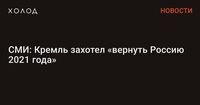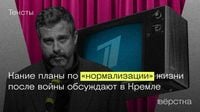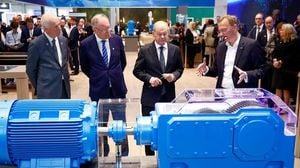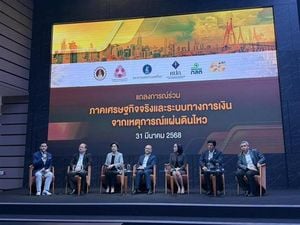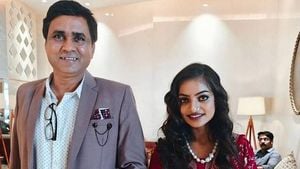In the corridors of power in Moscow, discussions are intensifying regarding plans to "normalize" life in Russia following a potential truce with Ukraine. According to reports from the media outlet Verstka, the administration of President Vladimir Putin is considering various strategies to reintegrate aspects of pre-war life, including the return of popular television shows and the easing of restrictions on certain individuals labeled as "foreign agents."
One of the most talked-about initiatives is the possible revival of the television show Evening Urgant, which was taken off the air by Channel One shortly after the onset of the war in Ukraine. Negotiations for its return have been ongoing for several months. Sources within the Presidential Administration have indicated that the show, hosted by Ivan Urgant, is likely to make a comeback only "after the truce."
According to one insider, there is a broader plan dubbed "Return to Russia 2021," aimed at attracting back those who left the country in 2022. This initiative is reportedly being discussed in the context of a potential cessation of hostilities. Another source pointed out that while there are hopes for Urgant's return, it could come at the cost of censorship and a loss of creative independence.
"There’s a certain plan to ‘return Russia to 2021’ to attract back those who left in 2022. It’s being prepared against the backdrop of a possible ceasefire," one source revealed. The discussions also include how to manage the return of individuals who left the country during the war but did not engage in illegal activities, particularly focusing on IT specialists and entrepreneurs who have not publicly opposed the war.
Alongside the potential return of Evening Urgant, the number of patriotic programs on Russian television has begun to decline, with an increase in entertainment shows that still incorporate patriotic elements. Insiders have noted a shift in programming, stating, "The number of patriotic shows is decreasing, while entertainment shows are on the rise, albeit with patriotic elements. For example, a guest on 'Let's Get Married' could be a fighter from Wagner."
Moreover, the administration is reportedly contemplating easing the process for removing the "foreign agent" status from individuals, allowing for a conditional period during which their status could be lifted if they do not violate any laws. This move is seen as part of a larger strategy to soften internal policies and restore public trust.
Sources have indicated that while there is no unified approach within the Kremlin regarding these plans, the discussions reflect a desire to manage public perception and reintegrate those who have been labeled as dissenters. Some officials have expressed skepticism about the feasibility of these initiatives, suggesting that many plans often end up discarded.
"I have heard about individual points of such 'normalization,' but not as a program of action—never. I wouldn't be surprised if there is some group under Sergei Kiriyenko discussing this. They discuss everything there... No one knows what Putin will pick in the next moment," one source commented.
Despite the ongoing negotiations, the fate of Urgant and the broader plans for normalization remain uncertain. The show host has not appeared on Russian television since February 2022, when he publicly expressed his anti-war stance, stating, "Fear and pain. No to war." Since then, he has been included in a list of "banned" artists whose work is prohibited in Russia.
Following the announcement of his registration as an individual entrepreneur in France, some Russian lawmakers have called for Urgant to be recognized as a foreign agent, further complicating his potential return. Nikolai Novichkov, a deputy from the United Russia party, has urged the Minister of Justice to investigate Urgant for possible foreign influence.
Amidst these developments, Urgant has continued to engage with his audience through social media, where he has amassed millions of followers. He has announced plans for a personal tour in various cities, including Haifa and Tashkent, which may serve as a precursor to further negotiations about his return to Russian television.
"After the tour, there are plans for him to visit Moscow and have several meetings. The subject of current discussions is the format of his return and the conditions. There will be victims, the loss of 'creative independence,' a new team, producers, scriptwriters, and so on," a source close to the discussions remarked.
While the Kremlin's intentions remain unclear, some insiders believe that the discussions about normalizing life in Russia are more about managing public relations than about implementing real change. The ongoing war, they argue, continues to shape the government's relationship with society, and any plans for a return to normalcy may be met with resistance from hardline factions within the administration.
As the situation unfolds, it remains to be seen whether the proposed changes will materialize or if they will be shelved like many previous initiatives. The sentiment among some officials is that the government remains firmly entrenched in its current trajectory, with little incentive to pivot towards a more open and reconciliatory approach.
In summary, the discussions within the Kremlin reflect a complex interplay of public sentiment, political maneuvering, and the ongoing realities of the war in Ukraine. While the potential return of Ivan Urgant and the easing of restrictions on foreign agents may signal a desire for normalization, the path forward remains fraught with uncertainty and skepticism.
